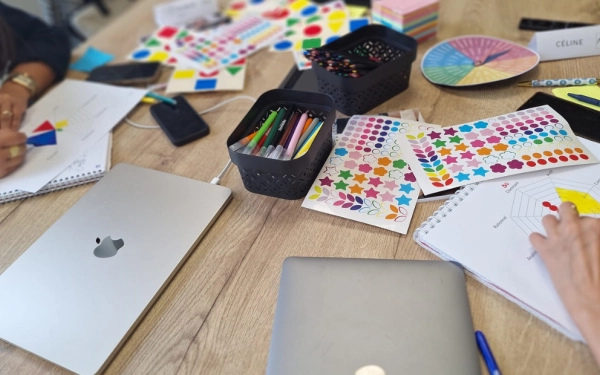6 key points for a successful job interview | Download our guide
That's it, you've applied and you've got a job interview! You're thinking: "Great, they're interested in me, I've got to rock it! A little stress arrives, it's normal, you want to succeed in your interview and get hired. To de-stress, the secret is to properly prepare for your interview.
Hereare 6 key points to help you prepare and make sure you're the lucky one!
1: Warm up mentally
 Practice telling your story. You need to be able to highlight the common thread running through your career path. You need to talk about your studies very briefly (the recruiter has your CV in front of them), and then make understand the link between your different experiences.
Practice telling your story. You need to be able to highlight the common thread running through your career path. You need to talk about your studies very briefly (the recruiter has your CV in front of them), and then make understand the link between your different experiences.
The question is: I say what?
First, ask yourself the right questions: Why did I choose to work for this company? What have I brought to it? What are my qualitative and quantitative successes?
L positions in the commercial field or with responsibilities, many of his candidates forget to talk about the results they had at their previous company. To do this, he recommends taking notes of your objectives, results achieved, KPIs... You need to show the return on investment that your eventual hiring will produce.
Some sample questions:
Tell me about your results, what are they? Do you have any significant examples of exceeding targets?
Could you describe your career path, listing the skills you've been able to draw from your various experiences as well as the reasons why you've changed companies?
Etc...
2: Make index cards

Before you even start making your cards, you need to do some groundwork in your research and ask yourself the right questions.
When was the company founded? What is its history? What are its values? Who are its managers? What market is it in? Who are its competitors?
The aim is to be able to note down in writing all the main elements of the company, in the manner of the case studies we may have carried out on companies during our school career.
Making index cards is not without a purpose. It will enable you to "revise" your interview so you can answer the recruiter's questions, and be able to explain what you've understood about the company.
Some sample questions:
How have you prepared for this interview?
What do you see as the company's strengths and weaknesses?
3: Prepare your questions about the company
 Now that you'vestudied the company and taken notes, you need to have questions. That's why you need to prepare your questions about the company, the position, the work environment...
Now that you'vestudied the company and taken notes, you need to have questions. That's why you need to prepare your questions about the company, the position, the work environment...
Don't lose sight of the fact that a job interview is an exchange, not an interrogation.
Some examples of questions to ask:
What are the concrete missions of the position?
Who will I be working with?
Is this a job creation?
What is the proposed remuneration? (be careful not to go into too much detail, such as bonuses or benefits, as this could be misinterpreted)
What is the recruitment process?
4: Preparing for the recruiter's questions (Even the wackiest ones)
 During a job interview, there are always unavoidable questions.. They concern your motivations, why you applied... It's up to you to train yourself to provide the best answers by correlating your background, the company and the position.
During a job interview, there are always unavoidable questions.. They concern your motivations, why you applied... It's up to you to train yourself to provide the best answers by correlating your background, the company and the position.
Some sample questions:
Do you remember a significant achievement in which you had to push yourself?
When did you fail? Describe what happened and what you learned.
Why should we hire you and not another candidate?
Ludovic D'Hooghe points out that some slightly offbeat questions unrelated to the position and the company may be asked by employers to check your ability to argue:
Why are manhole covers round?
How heavy is the Eiffel Tower?
How many tennis balls can fit inside an A380?
5: Find your difference!

You know very well, you're not going to be the only candidate interviewing for this position. It's important to stand out, and to do that, you need toshow off your special features. Identify your strengths and values. Ask yourself what message you want to get across during your interview.
The psychological aspect is important, which is why you can prepare by self-analyzing or conducting a mock interview with a family member, for example.
Your objective is to find the differentiating element compared to other candidates. But be careful not to overdo it.
6: Prepare your documents

There are a fewessential items to prepare for your interview. Don't forget to print out your CV to present at your interview. References are recurrent in companies, so you can already ask your former managers and/or supervisors for references to support your application.
And above all, don't forget to take a notebook and also a pen to take notes in order to give feedback to your recruiter systematically after each interview.
As we're super nice to you, we've prepared a downloadable guide to help you prepare for your interview! All you have to do is click... Then it's up to you!"
Download the guide




